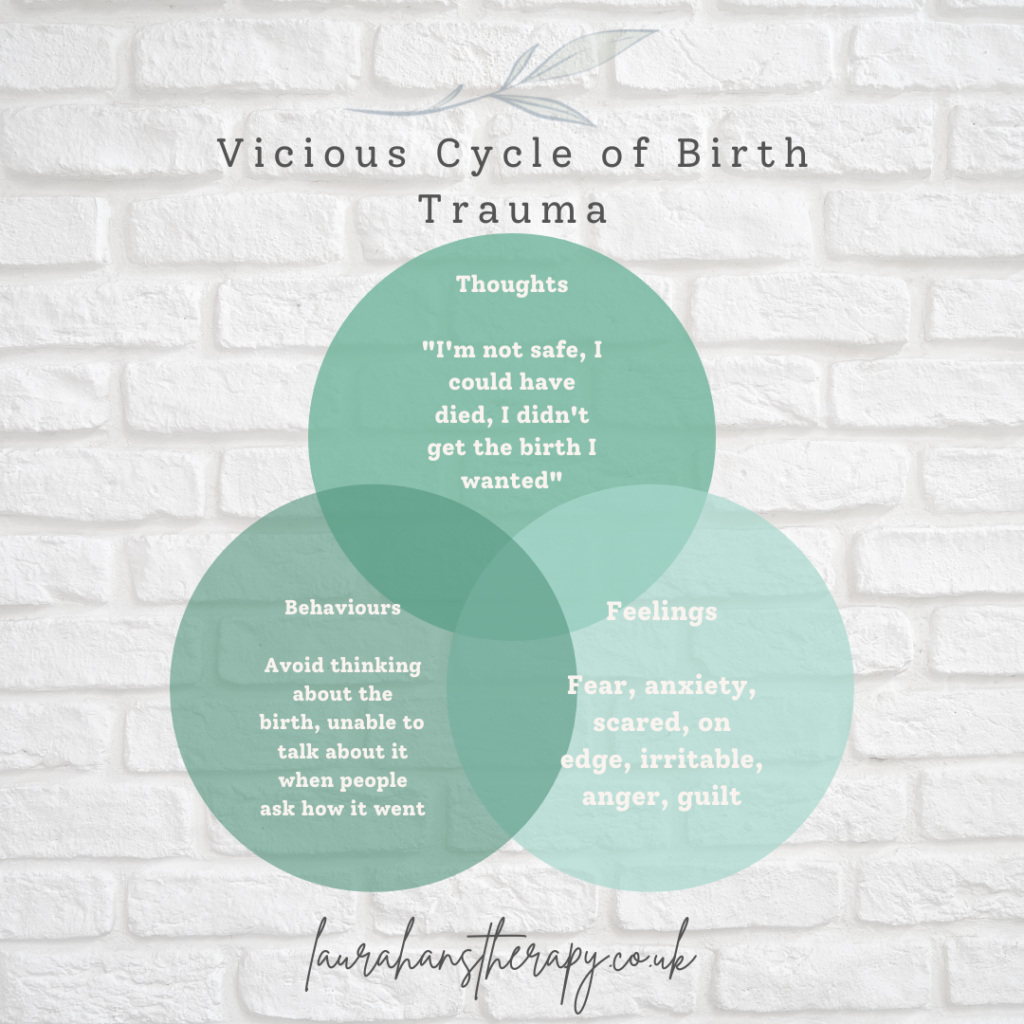TW – Birth Trauma
What is Birth Trauma?
The Birth Trauma Association describes ‘birth trauma’ as ‘a shorthand phrase for post-traumatic stress disorder (PTSD) after childbirth’. It is also used when an individual has some symptoms of PTSD, but not enough for a full diagnosis.
PTSD was originally identified among veterans returning from the Vietnam War. Many people still believe the condition is only experienced by soldiers. But PTSD can follow any traumatic event. Things like being in a car accident, experiencing sexual abuse or having a very difficult birth. It can also affect people who have witnessed a traumatic event. This is why some partners, and even midwives, experience PTSD following a traumatic birth.
Typically, what makes birth traumatic is the fear you or your baby are going to die. For example, we often see birth trauma when there has been a large loss of blood or the need to have an emergency caesarean. However, your birth can be medically and objectively ‘normal’ and you can still go on to experience a trauma response.
How you are made to feel throughout your birthing experience plays a huge role in the development of birth trauma. Other contributing factors include how you are spoken to, whether events and interventions are communicated to you, and the feeling of being out of control (of your body or of the situation).
Signs and Symptoms to Look Out For
Not everyone who’s been through a traumatic experience suffers from PTSD, but many do. It’s a normal response to a stressful situation, not a sign of weakness, and it’s not something you can control. Here are some signs and symptoms to look out for:
- Repeatedly re-living the traumatic event through flashbacks, nightmares or intrusive memories that make you feel distressed and panicky.
- Avoiding anything that reminds you of the trauma. For example, refusing to walk past the hospital where you gave birth, or avoiding meeting other people with new babies.
- Feeling anxious and hypervigilant. For example, being constantly alert, irritable and jumpy because you’re worried something terrible is going to happen to you, your partner or your baby.
- Feeling low and unhappy. This can include feeling guilty and blaming yourself for your traumatic birth. You may also have difficulty remembering parts of your birth experience.
For more information read What Is Birth Trauma?
Strategies for Coping with Birth Trauma
- Reclaim Your Life
Following a traumatic experience, people often report feeling as though they have changed, and/or their life has changed in some way. As a result, they may start living their lives differently. For example, by stopping or reducing doing things they once valued or enjoyed. This can create or increase the feeling that they’ve lost a part of themselves.
Focusing on reclaiming your life can be incredibly beneficial for low mood and trauma recovery because it can help you feel like yourself again. Here are some questions you can ask yourself as you begin this process:
- What hobbies did you have before the trauma?
- What things did you enjoy doing?
- What did you value in life? (For example, being outside, helping the community)
- What made me feel good?
- What would you like to get back to?
- Who can support you to get started?
- What can you do instead of the task you may no longer be able to get back to? (Doing something, even if it's a different activity, is better than not doing anything at all).
- Break the Link Between Then and Now
When we go through a very stressful experience like birth, sometimes the brain can become so overwhelmed it does not process the situation as it normally would. It’s too busy prioritising your survival. This means the memory of the experience can get stuck in its unprocessed state. Then, when you are triggered in the present, the brain responds as if the event is happening again. This can make you feel as if you’re re-experiencing your past trauma in the present.
When this happens, you will often automatically focus on the similarities between the original traumatic experience and the current trigger. For example, the smell of disinfectant may take you right back to being in theatre where you delivered your baby. By focusing on the smell, you are more likely to continue thinking the past is present. Your attention will be on what is similar about the current situation (now) and your birth experience (then).
Purposely focusing on differences can help you break that trauma link between what happened then and what is happening now. For example, then I was in hospital, now I am at home. Then I was lying in theatre, now I am walking around my kitchen. Then I was in a room full of hospital staff, now I am surrounded by family.
- Ask for Help
These steps may be all you need to manage symptoms of birth trauma, but many people find they need professional support to recover. You can self-refer to your local talking therapies service, but waiting lists can be lengthy. You should be fast tracked if you are pregnant/postnatal and needing psychological support, although this doesn’t always happen due ongoing stresses and strains on NHS provision.
I am trained in Trauma-Focused CBT and EMDR Therapy which are both NICE recommended for overcoming birth trauma. If you’re interested in working with me, you can book a free consultation here. I also share lots of tips and advice via Instagram.
Finally, be kind to yourself. You have been through a traumatic experience. It’s natural to feel overwhelmed by emotions and anxiety. Getting extra support and help with this can make a big difference.
Useful Links
Is Paying for Private Therapy Worth It?
Real Experiences of Coping with Birth Trauma Podcast Episode
